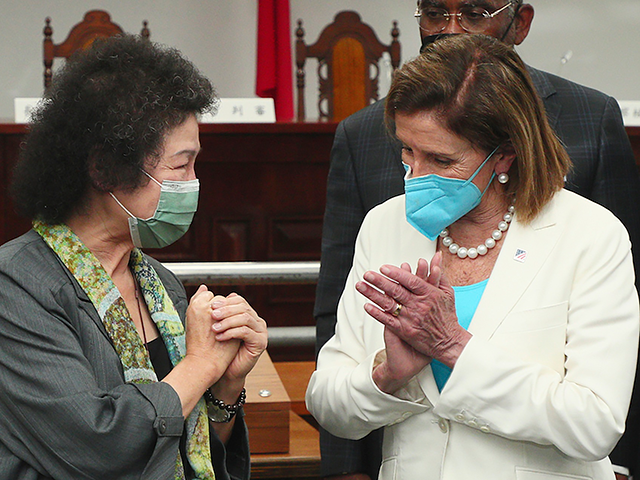Taiwanese President Tsai Ing-wen condemned China on Thursday for launching missiles “into some of the busiest transportation corridors in the world” in an ongoing attempted protest against Speaker of the House Nancy Pelosi (D-CA) visiting the island nation.
Pelosi landed in Taipei on Tuesday evening, meeting on Wednesday with Tsai and top legislators to affirm her support for the country. The move has outraged Beijing, which falsely claims Taiwan — a sovereign nation with unofficial but friendly relations with America — as a “province” and maligns Tsai as a “separatist” leader.
“Today, China initiated live-fire military exercises in areas around Taiwan. This type of continued, deliberately heightened military threat, especially the dangerous launch of missiles into some of the busiest transportation corridors in the world, is irresponsible,” Tsai asserted, “both to Taiwan and to the entire international community.”
President Tsai also warned in her address that China may carry out cybernetic attacks upon Taiwan.
“China most likely will conduct intensive information warfare operations,” President Tsai said. “These will include cyberattacks on Taiwan’s public and private sectors, as well as attempts to cause psychological unrest among our people through disinformation campaigns.”
In retaliation to Pelosi’s visit to Taiwan, China has effectively deployed a naval blockade around Taiwan with a series of live fire military exercises across six maritime areas that will run from August 4-7. China fired 11 ballistic missiles near Taiwanese territory on Thursday during a series of “live fire military exercises” that have blockaded the Asian nation.
According to China’s state-run Global Times, an aircraft carrier group deployed by the Chinese People’s Liberation Army (PLA) near Taiwan as part of the blockade is allegedly accompanied by a nuclear-powered submarine.
“Normally, a nuclear-powered submarine will accompany an aircraft carrier group in its mission,” Zhang Junshe, senior research fellow of the PLA’s Naval Research Academy said to the Global Times on Thursday.
As an additional retaliatory move, China has also expanded its trade sanctions on Taiwan, suspending natural sand exports to Taiwan and blocking imports of Taiwanese citrus fruits, chilled white scallops and frozen mackerel.
Members of Taiwan’s current ruling party, the Democratic Progressive Party (DPP), also condemned the Chinese blockade.
“They have chosen among the world’s busiest civilian airspaces and sea lanes for their live-fire exercises. This unilateral action disregards its international obligations,” DPP spokeswoman Hsieh Pei-fen said. “It shows that China’s actions run counter to democratic values cherished by the international world.”
China’s blockade of Taiwan has drawn the condemnation of international groups and organizations. The Group of Seven (G7), via a statement released on August 3, called the Chinese government to not use Speaker Pelosi’s visit as a “pretext for aggressive military activity in the Taiwan Strait” while calling both parties to exercise restraint
President Tsai thanked the support of the G7 through a social media post, where she reiterated her commitment to ensuring stability in the region.
Thank you to the #G7 for supporting regional peace & stability. #Taiwan is committed to defending the status quo & our hard-earned democracy. We’ll work with like-minded partners to maintain a free & open Indo-Pacific.
— 蔡英文 Tsai Ing-wen (@iingwen) August 4, 2022
In a statement released on August 3, the Association of Southeast Asian Nations (ASEAN) expressed their concerns while calling for “maximum restraint” between both China and Taiwan. “Asean calls for maximum restraint, refrain from provocative action and for upholding the principles enshrined in United Nations Charter and the Treaty of Amity and Cooperation in Southeast Asia,” the statement reads.

COMMENTS
Please let us know if you're having issues with commenting.